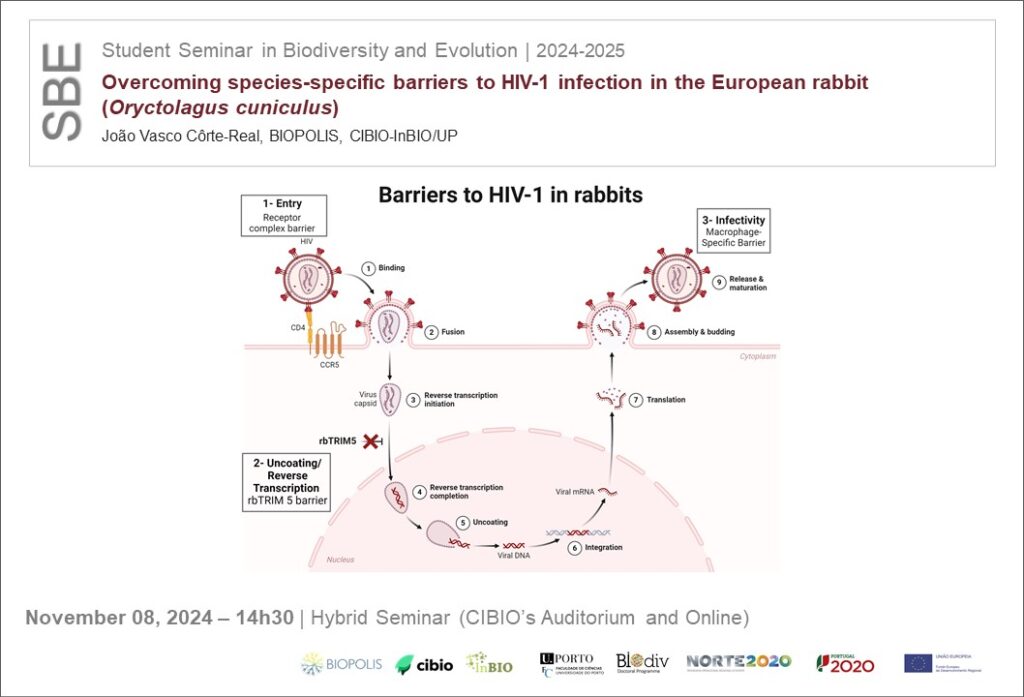Overcoming species-specific barriers to HIV-1 infection in the European rabbit (Oryctolagus cuniculus)
João Vasco Côrte-Real, BIOPOLIS, CIBIO-InBIO/UP
November 08, 2024 | 14h30 | CIBIO’s Auditorium and Online (https://videoconf-colibri.zoom.us/j/99764286136)

Rabbits are being explored as potential model species for HIV-1 since rabbit cells display fewer replication barriers: 1- they are not permissive to virus entry, 2- rabbit TRIM5 blocks HIV-1 reverse transcription, and 3- a primary rabbit macrophage-specific barrier reduces virion infectivity by a yet unknown mechanism. In light of generating a transgenic rabbit model that supports HIV-1 infection, our goal was to investigate whether minimal modifications to rabbit CD4 and CCR5 were sufficient to overcome the first barrier and thus enable HIV-1 entry into rabbit cells. Furthermore, we wanted to investigate guanylate binding proteins (GBPs) and function, specifically in rabbits as a potential restriction factor responsible for the third barrier. Computational modelling and evolutionary analyses of rabbit CD4 and CCR5 identified amino acid residues in both receptors that are predicted to prevent HIV-1 entry. Based on these in silico analyses, we generated a set of seven human-rabbit CD4 and CCR5 chimeras via site-directed mutagenesis and compared them to the respective wild-type proteins. Immunofluorescence experiments confirmed that all chimeras were localized at the cell surface. Furthermore, all CD4 chimeras were down-modulated by HIV-1 Nef and Vpu. Fusion assays with humanized rabbit CD4 and CCR5 supported virion fusion of different HIV-1 strains as efficiently as the human receptor complex. Furthermore, we performed infection assay in rabbit cell line expressing the combination of humanized entry receptors which allowed HIV-1 infection at day 3 to similar extent to human control. The evolutionary analysis of GBPs showed a pattern of gene gain and loss. In primates, GBP3 is exclusive to Simians and most likely originated from GBP1. Moreover, the emergence of GBP7 seems to be originated from GBP4 and GBP7 is exclusive to primates. The evolutionary study of muroid Gbps is quite complex with the most striking results being the formation of 4 new groups. In lagomorphs, we observed that they lack GBP3, 6 and 7. Leporidae experienced a loss of GBP2, a unique duplication of GBP5 and a massive expansion of GBP4. Gene expression analysis demonstrated varied tissue expression. Four ocGBPs were IFN-inducible and only one GBP inhibited furin activity, crucial for HIV-1 restriction. In conclusion, computational modelling allowed us to identify restrictions to HIV-1 entry into rabbit cells that could be overcome by mutagenesis of CD4 and CCR5. From an evolutionary perspective, GBPs experienced multiple gain and loss events, and functional characteristics of ocGBP suggest a role in innate immunity and potential restriction factor of HIV-1. Thus, our findings contribute to the development of a fully permissive transgenic rabbit model for HIV-1 infection.
More information here